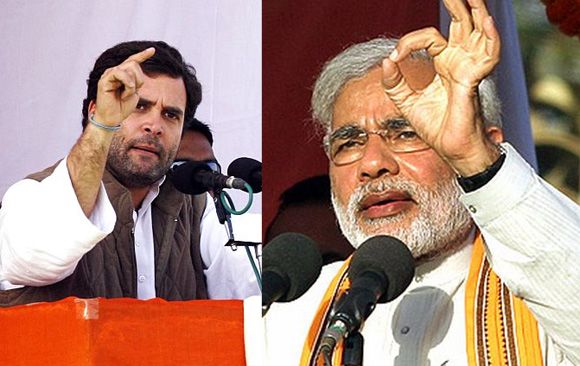 | « Back to article | Print this article |
 Modi will need to understand that the formula for success will have to be Local Leaders + Modi and not Modi alone...
Modi will need to understand that the formula for success will have to be Local Leaders + Modi and not Modi alone...Dr B Venkatesh Kumar, Professor at the Centre for Governance and Public Policy at the Tata Institute of Social Sciences, Mumbai, lists some learnings from the 2013 assembly election results.
Madhya Pradesh was Shivraj Singh Chouhan's victory. He was the face of the Bharatiya Janata Party in MP and he alone has been responsible for the party's victory in the state.
Chouhan has been able to convert government policies and programmes into action and delivered it.
The results were visible, people were benefitted from it and the bureaucracy has clearly supported him in executing these programmes.
His style of governance has been one of the most important reasons why the BJP retained its majority in the MP assembly.
What kept the BJP from completely breaking into the Congress votebank were its own people -- the ministers who were unpopular and those who kept Chouhan and the BJP from surging ahead. There hasn't been a drastic change from the 2008 election when the BJP won 143 out of 230 seats.
I would also imagine that Congress leader Jyotiraditya Scindia may have arrested the BJP landslide. You cannot write off his charm. He could have been a real threat.
It is possible that the Congress could have benefitted from declaring Scindia as a potential alternative to Chouhan a little sooner.
All knowledge comes in retrospect and it must be understood that MP has a lot of heavyweight Congress politicians -- Digvijay Singh, Kantilal Bhuria et al -- and that decision could have swung the other way too.
The victory in Madhya Pradesh has upped Chouhan's stock in the BJP. It shows he is still in the race for prime minister and that he has his own turf.
MP has 29 Lok Sabha constituencies and therefore in 2014, he will hold some amount of sway.
Rajasthan has been a cyclical phenomenon. If you have seen the last few elections, one of the two parties scores a landslide victory and the other does poorly.
In 2003, the Congress party lost badly, but returned to power in 2008 when the BJP was factionalised.
This year, while the BJP seems to have got its act together, the Congress party has been a victim of factionalism.
Besides Chief Minister Ashok Gehlot's misgovernance, the Gehlot-C P Joshi tussle has obviously cost the Congress a fair bit.
What worked for the BJP this year was the fact that it looked beyond its factionalism, got everyone to rally around Vasundhara Raje and scored a victory.
I also suspect there was some amount of do-or-die element in the BJP that translated into the kind of support that Raje received.
Obviously, there was some diktat from the top leadership instructing party cadres to support Raje.
No one expected the Aam Aadmi Party to do so well in Delhi. But it did.
The general thinking is that the AAP would eat into the BJP vote bank. However that thinking is clearly wrong. The party has instead eaten into the Congress vote bank and how!
A party that has been in power for three successive elections is now reduced to a single digit presence in the assembly!
Sheila Dixit was one of India's most successful chief ministers. It was under her that Delhi was transformed.
She oversaw the successful completion of some of the biggest infrastructure projects and really did change the face of Delhi infrastructurally.
But again, she was unable to instil confidence in people.
Women's safety has been an issue she hasn't been able to tackle and the Delhi rape case was the final nail in her coffin.
Traditionally, the lower middle class and lower class populace voted for the Congress party. That vote bank shifted its allegiance to the Aam Aadmi Party.
For the first time ever, the people of Delhi saw a serious alternative to the Congress party and the BJP and they lapped up the opportunity.
The kind of impact the AAP has had is unprecedented. Despite the AAP's stupendous success, it is too early to hail the AAP as the next big thing for 2014.
To make an impact, the AAP will have to work really hard. More importantly, it will have to look at aligning with other movements and other parties, especially from the Left.
The biggest takeaway from these assembly elections is that 2014 will not be Narendra Modi versus Rahul Gandhi alone.
Modi's stock may have gone up with this success, but I would imagine Shivraj Singh Chouhan's stock has gone up more.
The 2013 assembly election has underlined the importance of local BJP leaders. It is their victory. Not Modi's.
Surely, there is some amount of a Modi wave, but for him to succeed, he will have no option but to work alongside local leaders like Shivraj Singh Chouhan and Vasundhara Raje Scindia among others.
He will need to understand that the formula for success will have to be Local Leaders + Modi and not Modi alone.
Finally, the BJP must understand that if anyone has won in Delhi, it is the AAP.
Dr B Venkatesh Kumar is a professor at the Centre for Governance and Public Policy at Mumbai's Tata Institute of Social Sciences. The subject of his doctoral thesis was the role of the Election Commission of India between 1975 and 2000.
As told to Abhishek Mande-Bhot.